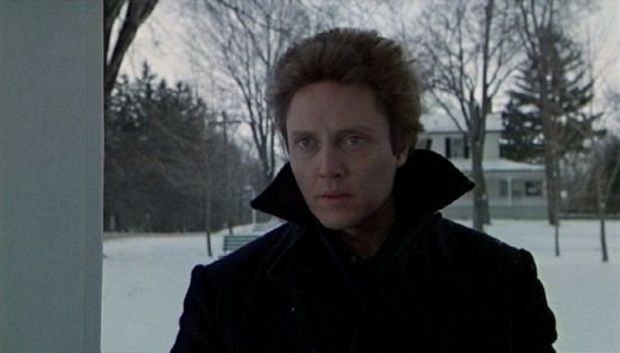As part of Dead By Dawn Festival
For those who believe that restraint is a recent addition to the directorial arsenal of David Cronenberg, such as in chilly psychological efforts like Cosmopolis and A Dangerous Method, The Dead Zone may come as something of a surprise. Appearing between the kinky psychosis of Videodrome and undisputed body horror classic The Fly in his filmography, his adaptation of Stephen King’s sci-fi thriller pares back the supernatural elements and functions as a strange, satisfying character study and meditation on destiny and one’s role in history. In light of recent political events, it is arguably more relevant than it has ever been.
Christopher Walken’s quietly intense presence bubbles through nicely even as he largely underplays the role of John Smith (the every man moniker surely no accident), a teacher living an unremarkable life and planning a future with his girlfriend Sarah (Brooke Adams). His life is shattered by a car crash that leaves him in a coma for five years. On awaking he discovers he possesses psychic powers, able to learn the secrets and future of any he touches. Despite hoping to avoid any publicity to recuperate and rebuild his body and his life, his talents are recruited by a local sheriff hoping to solve a murder.
The Dead Zone is a curiously structured film. It has three distinct sections. The accident and the beginning of recuperation, the murder story which is resolved far more quickly than one would expect, and the most crucial section in which Smith decides to take action against a ruthlessly ambitious populist politician, Greg Stillson (Martin Sheen), who Smith learns will ascend to the presidency and will be responsible for the launch of nuclear weapons. Anyone who can contain an industrial strength shiver down the spine during that scene is made of stern stuff, and it’s a fine example of Cronenberg’s calm approach playing dividends.
Cronenberg strips away the back story of Sheen’s politician from King’s novel. Whereas the source material presents Smith and Stillson as being yin and yang versions of each other, in each other’s destiny since since childhood, the film depicts Stillson as a pure agent of political chaos. Greedy, manipulative, and playing on the worst instincts of his potential voters. It offers Smith the dilemma of being a saviour, but to likely go down in history as a modern day John Wilkes Booth.
Looking back from the political nadir of 2017, this critique of the era of Reagan actually looks somewhat quaint. However, The Dead Zone remains a softly chilling film, directed with beautiful control by one of the greatest genre filmmakers in history. Putting aside its odd structure, which affects the momentum slightly, this remains one of the finest of the many adaptations of Stephen King’s stories.


Comments